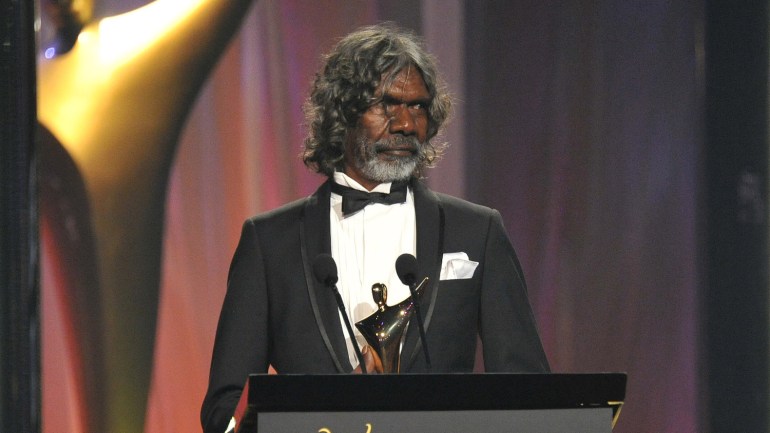The late David Gulpilil will receive AACTA’s highest honour, the Longford Lyell Award, for his outstanding contribution to Australian cinema on Wednesday.
The legendary actor died on Monday, aged 68, four years after a diagnosis of terminal lung cancer.
AACTA began work on the tribute and award six months ago, with Gulpilil accepting the honour a few weeks ago from South Australia as he was unable to travel.
First presented in 1968, the award honours Australian film pioneer Raymond Longford and his partner in filmmaking and life, Lottie Lyell. Previous recipients include Cate Blanchett, George Miller, Paul Hogan, Jack Thompson and Jacki Weaver.
AACTA has said this year’s prize acknowledges not just Gulpilil’s incredible body of work, but his role in creating more diverse, inclusive, and truthful Australian stories.
A Mandjalpingu man from Ramingining, Arnhem Land, Gulpilil’s first role was in Nick Roeg’s 1971 film Walkabout as a teenager.
The award falls on the film’s 50th anniversary, and honours the actor’s subsequent lengthy body of work, spanning films likes Storm Boy, The Last Wave, The Proposition and Rabbit Proof Fence, as well as the two highest grossing Australian films of all time, Crocodile Dundee and Australia.
Gulpilil won his first AFI Award for Best Actor in 2002 for The Tracker, his first lead role.
That project was directed by Rolf de Heer, and the pair would continue to collaborate on a number of films, including 2006’s Ten Canoes, the first Australian film entirely in Indigenous languages, and Charlie’s Country, for which Gulpilil became the first Australian to win the Best Actor Award in Cannes’ Un Certain Regard section. The film also won him an AACTA Award.
Gulpilil’s final film, My Name is Gulpilil, in which he tells his own story, is nominated for the AACTA for Best Documentary. It is directed by Molly Reynolds and produced by Gulpilil, de Heer and Peter Djigirr.
Gulpilil will be honoured at Wednesday’s AACTA Award ceremony via a visual presentation, with a live introduction from rapper, dancer, and hip hop artist Baker Boy.
In an already released tribute, actor Natasha Wanganeen spoke of Gulpilil’s influence on her own career.
“When I saw you on TV, I stopped my dad and said ‘Dad, he looks like us’,” she said.
“And I’ll never forget the words he said to me. He said, ‘Baby, he is us.'”
AACTA CEO Damian Trewhella said: “David carried the legacy of his people into all his performances creating an authenticity that had never been seen widely before, and will never be forgotten.
“By redefining how the world sees Indigenous Australians, he paved the way for the next generation to reject cultural stereotypes and express their own truths. All Australia owe him a debt.”
The Yolŋu community and kin of the late David Gulpilil, following a respectful period after his death, have now given permission for his name to be used, as was his wish.


